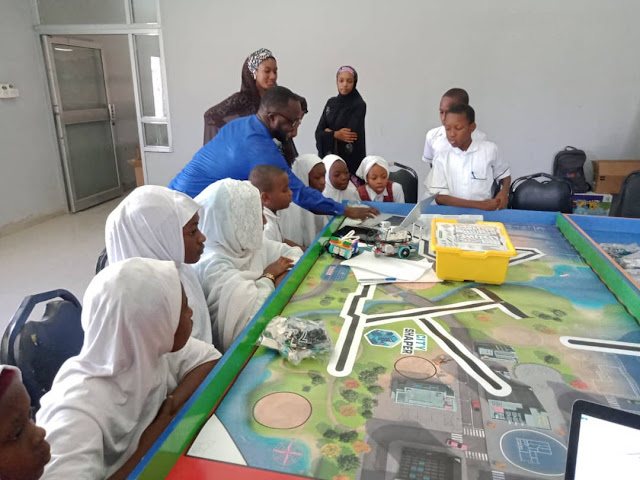Introduction
In an era marked by digital disruption and the need for agile learning environments, libraries across the globe are evolving beyond their traditional roles as book repositories. One of the most transformative developments in this evolution is the introduction of Makerspace Technology. At the National Library of Nigeria and other forward-thinking institutions, makerspaces are redefining the concept of learning, creativity, and community engagement. But what exactly is a makerspace, and why does it matter for libraries in Nigeria?
As Nigeria seeks to reposition itself for the demands of the Fourth and emerging Fifth Industrial Revolutions, it is increasingly evident that access to knowledge must go beyond passive reading. Libraries must serve as dynamic ecosystems for creativity, skill-building, and digital innovation. Makerspaces fill this need by providing the tools, mentorship, and inclusive environments that empower Nigerians, particularly the youth, to transform ideas into tangible solutions. From digital storytelling to prototype development, makerspaces are becoming central to how libraries drive social inclusion, economic empowerment, and knowledge democratization.
What is a Makerspace?
A makerspace is a collaborative workspace equipped with tools and resources for making, learning, exploring, and sharing. It is a creative, DIY space where people can gather to create, invent, tinker, and learn using a variety of tools ranging from simple craft materials to advanced technologies like 3D printers, robotics kits, laser cutters, and coding platforms. Makerspaces promote hands-on learning and foster a culture of innovation among users of all ages and backgrounds.
Unlike conventional classroom settings, makerspaces emphasize project-based, experiential learning that encourages users to fail forward, iterate, and grow. In a makerspace, knowledge is constructed through doing rather than passively received through instruction. This model supports diverse learning styles and cultivates a mindset of innovation, resilience, and collaboration. For communities often excluded from formal STEM opportunities, such as rural populations, women, and economically disadvantaged groups, makerspaces serve as crucial democratizing tools that break down barriers to technological participation and creative expression.
Why Makerspace Technology is Relevant to Nigerian Libraries
For a country like Nigeria, where youth unemployment, technological illiteracy, and underdeveloped innovation infrastructure remain critical issues, makerspaces provide a powerful solution. Integrating makerspace technology into public and academic libraries offers the opportunity to bridge the gap between theoretical learning and practical skills development. It provides access to tools and mentorship that many young Nigerians would otherwise not encounter.
Moreover, the inclusion of makerspaces in Nigerian libraries aligns with national objectives such as the Nigeria Vision 2050 and the Digital Economy Policy and Strategy (2020–2030), which seek to harness technology and innovation to drive sustainable development. Libraries, when equipped with makerspaces, can serve as low-cost, high-impact platforms for realizing these objectives at the grassroots. By facilitating digital skills training, entrepreneurial incubation, and creative problem-solving, makerspaces can reposition libraries as engines of inclusive development, especially in underserved urban and rural communities.
Makerspaces in Libraries: From Consumption to Creation
Traditional libraries are centered around information consumption reading books, browsing archives, and researching databases. Makerspaces shift this paradigm to emphasize information creation. In a library makerspace, a student might learn to design a prototype for a science project, a teacher might create low-cost teaching aids, or a job-seeker might learn basic coding to improve employability.
Benefits of Makerspace Technology in Libraries
1. Skill Development: Users gain practical knowledge in areas like robotics, programming, electronics, graphic design, and digital fabrication.
2. Fostering Innovation and Entrepreneurship: Makerspaces can incubate ideas that lead to startup businesses or community development solutions.
3. Encouraging STEM Education: By making science and technology hands-on and fun, makerspaces support interest in STEM (Science, Technology, Engineering, Mathematics) disciplines.
4. Inclusivity and Community Building: Makerspaces serve as inclusive hubs where users from diverse backgrounds work together, share knowledge, and solve problems.
The Role of the National Library of Nigeria
As the apex library institution in Nigeria, the National Library is strategically positioned to lead the way in integrating makerspace technologies into the country's knowledge infrastructure. By embedding makerspaces in its facilities across the federation, the National Library can:
- Promote digital and technological literacy.
- Partner with educational institutions to develop relevant makerspace curricula.
- Support government initiatives on innovation, youth empowerment, and national development.
Challenges and the Way Forward
Despite the promise, implementing makerspace technology in Nigerian libraries is not without challenges funding constraints, lack of skilled personnel, inadequate infrastructure, and low public awareness can impede progress. However, strategic partnerships with tech hubs, NGOs, donor agencies, and the private sector can provide the needed support. The National Library can also organize training workshops to equip librarians with the skills to manage and facilitate makerspaces.
Conclusion
Makerspace technology is more than just a trend; it is a transformative tool that aligns with the National Library of Nigeria’s mission to promote lifelong learning and national development. By embracing makerspaces, libraries in Nigeria can become dynamic centers of innovation nurturing the next generation of thinkers, inventors, and problem-solvers. Now is the time to shift from passive consumption to active creation. Libraries are no longer just about books; they are about building the future.

AFRO DATE ORG//ADD US ON WHATSAPP +2348107906879
ReplyDeleteGET CONNECTED TO THE MOST RICHEST SUGAR MUMMIES SUGAR DADDIGAYS & LESBIAN CONNECTION SERVICES BALOGUN JOSEPH... 08107906879
WE HAVE CONNECTION IN ALL THE STATE IN NIGERIA, GHANA, COTONOU, TOGO, CAMEROUN, IVORY COAST AND SOUTH ffAFRICA, WE ALSO HAVE SERVICES IN BOTH EUROPE AND AMERICAN COUNTRIES SUCH AS USA, UK, GERMANY, BRAZIL, HOLLAND, CANADA, MALAYSIA AND SOME OTHER OVERSEA COUNTRIES, MAXIMUM SECURITY IS GUARANTEE FROM ANY SERVCE WE GIVE TO YOU ,this is a 1st class dating Organisation, registered, licenced, we have top class people, both men and women, boys and girls, looking for opportunity to mingle and be friends, we have high class and rich sugar mummies, sugar daddies and lesbian single ladies and mummies, who are top shots, the likes ofpoliticians, directors, bankers, managers, executives, enterpreneur, oil barons, we have clients outside nigeria in Uk, South Africa, Ghana, Beninrepublic, Dubai, US & UK
Contact database administrator on
08107906879
Balogun Joseph (08107906879)